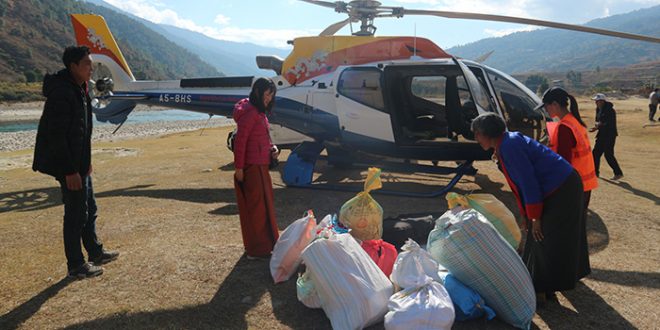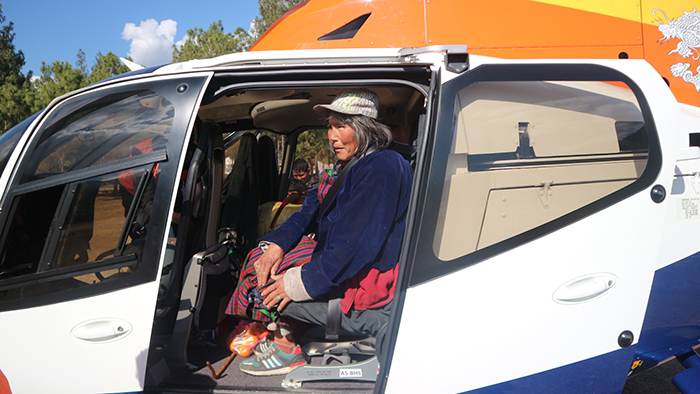
It’s 8 am. Paro is frosty and calm. Inside an old aircraft hanger, ground crew of the Royal Bhutan Helicopter Service Limited (RBHSL) prepares the A5 airbus chopper for take off.
In about half an hour, the rotor blades are spinning as the A5 hovers over the valley. From the northern Himalayas to the desolated paddy fields and clustered settlement of Thimphu, the splendid view from the sky comes to an abrupt end as the chopper descends along the Mochhu in Punakha.
Soon after it touches ground on the dusty helipad at Zomlingthang, its enthusiastic passengers get prepared to go home. “The chopper is like a taxi for the Lunaps,” said a crew member.
The chopper made four trips to Lunana from Zomlingthang yesterday as it transported the residents of Lunana home. And this is not unusual. At times both choppers had to be deployed making between eight to 10 trips a day.
Crew members quickly ready the weighing scale and start weighing the passengers and their cargos, while the captain, who the Lunaps affectionately calls as the driver, pulls out two seats to accommodate the luggage.
Sacks and cartons, the luggage of a Lunana resident contains almost everything imported. Instant noodles such as Wai Wai, beverages like Appy, Druk 11000 beer, garments, edible oil, meat, chicken, buckets, processed cheese, utensils, eggs, compound bows, rice, roasted rice, biscuits, footwear, toys and everything that are available in the shops of Punakha.
“In a place like Lunana, everything is vital for survival,” said Sonam who came to see his family off to Lunana. “Men usually take the horses and make the journey on foot taking about a week,” he said adding that the chopper service has made it easier for women, children and the elderly to travel.
While the chopper can accommodate up to six passengers, Lunaps forgo the seats for their luggage.
The Chief Executive Officer of the RBHSL, Chewang Gyeltshen said initially the chopper used to carry only passengers. Of late, he said passengers from Lunana started transporting goods including construction materials.
Back on the ground, officials make sure everything is weighed correctly as it can prove dangerous if overloaded. The A5 can ferry about 330 Kgs in winter and about 250 Kgs in summer because of the temperature.
Another official is involved in collecting cash from the passengers. Some passengers share the fare among themselves depending on the weight of their luggage, while others with heavy load choose to bear the cost single-handedly.
A regular chartered flight could cost about Nu 150,000 an hour. However, the RBHSL offers about 34 percent discount to the people of Lunana. In addition 50 percent of the cost is born by the government, which lowers the fare to about Nu 55,000 a trip from Zomlingthang to Lunana. The round trip from Zomlingthang to Lunana takes almost an hour.
“Chopper service is the most beneficial among the development activities that happened in Lunana,” said the village tshogpa, Pema who is the main contact person between the RBHSL and the community. But almost every household has the contact number of the RBHSL officials and almost every resident in Lunana has taken a ride on the chopper.
Each flight that returns from Lunana carries chhugo (hardened cheese), curd, butter and cheese. The chopper also delivers parcels from the mountains to their family who are waiting at the bank of the Mochhu.

Gyem Lham, 65, readies for takeoff
A religious journey
Among many others who flew home yesterday after attending the moenlam chhenmo in Punakha,Gyem Lham, 65, considers herself blessed as she could attend three moenlam chhenmos in Punakha in a row.
Up in the mountains, she said people hardly get to attend prayers and religious ceremonies. “Because of the helicopter, I was able to understand the words of Buddha,” she said.
As her turn to board the chopper arrived, she limped towards the chopper and looked nervous. “It’s my third flight and I still don’t feel comfortable,” she said. “But it is still better than walking.”
She said she usually closes her eyes and kneels down to overcome airsickness. “While in the air, I don’t know where I have reached and neither do I look outside,” she said.
A 40-year-old Passang Lhamo also flew to Punakha to attend the moenlam chhenmo. “I feel blessed and sanctified,” she said adding that she will always remember the words of the Buddhist masters who presided over the ceremony.
But unlike Gyem Lham, she is excited to fly even though she has been on the chopper four times. “Every flight is different from the last,” she said.
The landing pad
While the benefits of the chopper service are immense to the people of Lunana, officials at the RBHSL are concerned about the landing pad.
CEO Chhewang Gyeltshen said that the landing pad in Zomlingthang is dusty and not conducive. The chopper’s engine is usually rinsed after every 50 hours of flight. However, he said that rinsing has to be carried out after every trip to Punakha because of the dusty ground in Zomlingthang.
While the construction of a more conducive landing pad has already been proposed to the government and is included in the 12th Plan, it needs to be prioritised.
An official from the RBHSL said that the danger of flying object damage (FOD) is a concern. Since the landing pad in Zomlingthang is a public ground, people play archery, picnic, learn driving, graze animals and often has tourists camping, which leaves the ground littered.
“There is every chance that FOD may hit the rotor blades,” the CEO said.
That way, the crew members said Lunaps have been very cooperative in cleaning up the ground before every take off and landing.
Even on ground, the CEO said the biggest challenge is in refuelling. A team is sent from Paro to Punakha with barrels of fuel in a bolero pick up every time they have a flight. Refuelling follows every landing in Zomlingthang.
Before the chopper service was introduced, tshogpa Pema said that most Lunana residents had never seen an aircraft. Now when people across the country desire to ride a chopper, it’s nothing extraordinary for the Lunaps, he says.
By now people of Lunana personally know the crew members and officials of the RBHSL.
Tshering Dorji | Punakha
Source: http://www.kuenselonline.com/chopper-service-a-taxi-to-lunana-residents/

